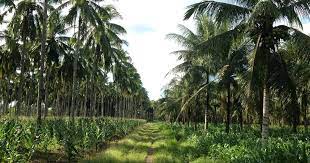Why Entrepreneurs Should Venture Into Coconut Farming, Cultivation

Coconut farming is the cultivation of coconut crops, which involves the growing of coconut seedlings, maintaining the coconut trees and harvesting the coconuts when they are matured.
Coconut is a type of fleshy nut produced by coconut trees. The coconut tree is a member of the palm family called Arecaceae. The coconut fruit has the husk, flesh and water.
Coconut farming is an important agricultural sector in Nigeria and Africa due to its economic importance and versatility. Coconut, which is scientifically known as Cocos nucifera, is a crop that thrives in the tropical regions of the world. In Nigeria and Africa, coconut is cultivated on a large scale, with the majority of the coconut plantations located in the coastal regions.
Coconut can do well in all states in Nigeria so far there is an irrigation facility. Without irrigation facilities, coconut can do well in 20 states in Nigeria. Most of these states are in the southern region of Nigeria.
Coconut naturally grows in areas with abundant rainfall. This is why coconut trees are usually seen scattered around in Southern Nigeria. The largest coconut-producing states in Nigeria are Lagos, Rivers, Bayelsa, Akwa Ibom, Imo, Abia, Ondo, Edo, Ogun, Oyo and Osun states.
According to the Food and Agriculture Organization (FAO), Africa produced 1.5 million metric tons of coconuts in 2019, with Nigeria accounting for a significant proportion of the production.
Currently, Nigeria produces about 265 tons of coconut annually. Coconut is widely eaten everywhere in the world, and are mainly found in the tropical areas of the world.
Coconut milk, coconut water, coconut oil and cocopeat are some of the products that can be derived from coconuts.
The oil from coconut is used in many products such as cooking oil, hair oil, skin oil, and soaps.
The following are the steps to take to cultivate coconut or start a coconut plantation in Nigeria:
Selection of Farmland Site
Your farmland should also have good roads so that your coconut produce can be easily evacuated to the market. The soil should be fertile. Coconut prefers sandy loamy soil.
Climatic Conditions
Climatic Conditions Suitable for Coconut Farming, it is a tropical crop; it can grow in warm and hot climatic conditions. Coconut will not do well in temperate climates.
Coconut prefers areas with an annual rainfall level of 2,000mm. The rainfall should be well distributed all through the year.
Coconut will not do well in highlands and uplands. This crop is naturally sited for lowland areas. Coconut can also tolerate high levels of humidity.
Soil Suitable for Coconut Farming
Coconut can grow in sandy soil, sandy loamy soil and sandy laterite soil. It is not uncommon to see coconut trees scattered around beaches and very sandy environment. Coconut can tolerate all types of soil but it does not do well in clay soil.
The soil pH should be 4.0 – 7.5. Coconut is hardy and will do well in acidic soils and soil that are alkaline. If your soil is too acidic, it should be amended with lime.
Soil Preparation
Trees, stumps and weeds should be removed from the farmland to make space for the planting of coconut seedlings or trees. This is usually done if your farmland has a lot of trees or if the farmland is situated in a virgin forest. Bulldozers can be used to remove the trees and stumps; however, care must be exercised so that the topsoil will not be removed.
After the removal of the trees and stumps, the soil should be ploughed and harrowed. Beds may be done to aid the growth of the coconut trees. Please note that if the farmland is a virgin forest, ploughing and harrowing may not be done.
For soil with low organic matter, farmyard manure, animal manure and compost can be added to the soil. These should be mixed with the soil through ploughing.
The soil should be ploughed several times till the soil forms a fine tilth. Tractors with harrowing implements may be used to harrow the farmland.
High phosphate fertilizers like Single Super Phosphate fertilizer or Diammonium Phosphate Fertilizer should be applied to every pit meant for planting the coconut seedlings. Depending on how fertile the soil is, up to 100 – 200 grams of Single Super Phosphate fertilizer may be applied per planting hole.
About 100 coconut seedlings can be planted on one hectare of farmland, if the planting pattern of 8 metres by 5 metres is used. If planting space of 7.5 metres by 7.5 metres is used, 175 coconut trees can be planted on one hectare. For high-density coconut planting, up to 500 coconut trees can be planted in one hectare.
Picking the Coconut Variety to Plant Equipment
This is the local open-pollinated coconut variety that is common in Nigeria. This variety can be found in the wild in Nigeria. It is also commonly grown in the southern part of Nigeria.
This variety starts fruiting after 5 – 7 years. Malaysian Dwarf Coconut Variety
This variety is an improved hybrid coconut variety. It is usually short in height but high-yielding. It also has an early maturity time. This coconut variety can start fruiting as early as 2 – 3 years.
Equipment
The following equipment can be used for coconut farming: Tractors, Boom Sprayer
Harrowers, Ploughs, Farm House, Power Tiller, Cutlasses, Hoes, Earth Augers
Motorised Sprayers, Weeders etc.
These tools can improve the efficiency of farm operations in coconut farming.
Harvesting
Coconuts are harvested after 2 – 5 years of planting the coconut seedlings depending on the variety of coconut planted.
Coconuts are usually harvested with the use of harvesting sickles. Mechanized tools can also be used to harvest coconuts from the coconut trees.
Yield of Coconut
The yield of coconut depends on the soil type, climate, availability of water, types of fertilizers used and other agronomic conditions. One coconut tree can yield over 100 coconut fruits.
Processing of Coconut Products
Coconuts can be processed into the following: Coconut Oil, Coco Peat, Coconut Milk, Coconut Water etc.
Marketing
Harvested coconuts are usually sold in the open market in Nigeria. They can also be sold in supermarkets and other places of commerce. Coconut products can also be sold all around Nigeria.









